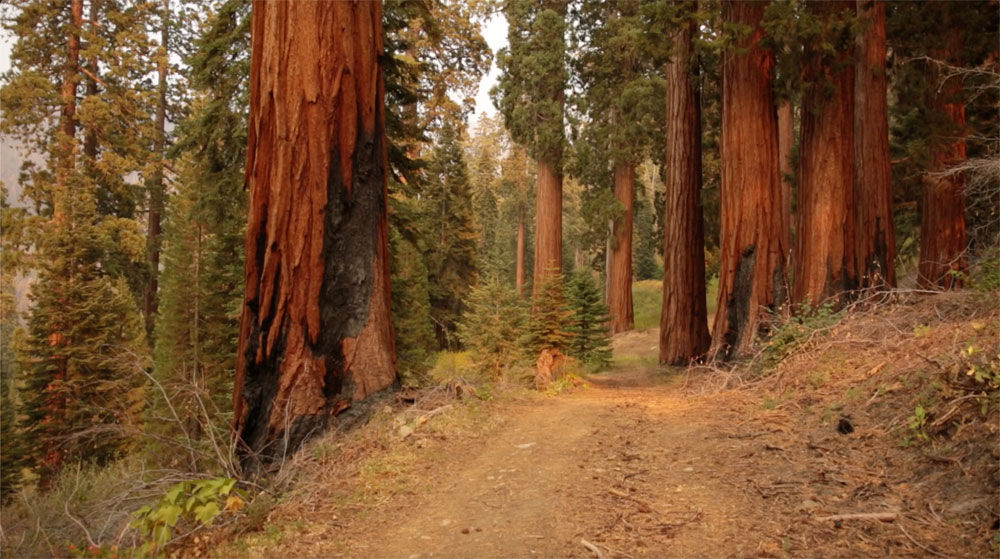
Still from Treeline (2021) by Ruth Maclenna © courtesy the artist
Treeline (2021) 17:51 mins
Selected by Whitechapel Gallery, London
Treeline (2021) is a collectively made film sourced from hundreds of hours of footage of forests submitted by people across the world. From a patchwork of disparate individual contributions (sent in by scientists, ecologists, artists and members of the public alike), Ruth Maclennan traces a sinuous green line that stretches from the wild woods of North America to the rainforests of the Amazon to the copses of middle England and the scrublands of Africa, as well as myriad places in-between.
Resembling a continuous horizontal travelling shot, Maclennan's infinite panorama of trees is a vivid reminder of the swathes of green that continue to encircle and nourish the planet, and a powerful emblem of the shared resources and shared futures that bind people together. A paean to the beauty and majesty of trees, Treeline also echoes something of their form – putting out exploratory feelers, and drawing material from multiple places to create an enveloping, overarching structure that is so much more than the sum of its parts.
Where are you from and how did you become interested in moving image work?
I grew up in London but thanks to my American and Scottish parents I spent memorable parts of my childhood climbing hills and mountains in New Hampshire and Scotland. I studied modern languages and once, a BBC cameraman in Moscow leant me a video camera to take on an ethnographic expedition to Western Siberia. My interest deepened while studying at the Hochschule der Künste in Berlin, where I became enthralled by Bruce Naumann’s videos and grainy VHS recordings of Pina Bausch, and then with the philosophical and mystical possibilities of Tarkovsky’s Solaris and the invention of Vertov’s Man with a Movie Camera. Moving images have become part of the contemporary human condition, informing the collective imaginary and material world. I continue to be fascinated by the ways the tools for making them help me observe, understand, and interpret the world as well as conjure alternative possibilities.
What inspired/influenced you to make the work?
The restrictions of the Covid-19 pandemic, the spread of wildfires around the world and the ethical imperative to reduce the carbon footprint of film-making were important factors in my conceiving Treeline. I was approached by Film and Video Umbrella (FVU) and Forestry England (FE) to develop a film project about forests to launch online during COP26. At the time I was making a series of short landscape films, Horizon, for The Crown Letter, which inspired the form and open call to contribute footage. From this starting point, Treeline was set in motion and it evolved through the many conversations I had with the curators, and with foresters, scientists, artists, and other contributors.
The idea for Treeline was not to have an aerial view from afar of the impacts of climate change on forests, but instead, to follow the gaze of individuals at home in their own forests. Trees and forests grow and spread in the ground, and I wanted to see and feel views from the ground and stitch them together to create a ‘nature corridor’ encircling the planet. I wanted to enable anyone to take part, to share their delight at a particular wood, their deep knowledge, or their shock or anger at what was happening to the trees they lived and worked worth.
Treeline refers to the treeline boundary in nature that varies with altitude, latitude, and temperature. As temperatures and atmospheric carbon dioxide concentrations rise, treelines are moving. The treeline also suggests lines that humans draw: such as clear-cutting in the Amazon and the destruction of forests for building cities and infrastructure. Also, treelines are visible in the rows of planted trees and the manmade edges of forests and woods. The film draws attention to the immense labour, care and hope involved in planting and tending trees.
What are you working on at the moment?
I recently completed the film A Forest Tale, shot last winter in the sub-arctic boreal forests of Russia, about living in forests and how trees are the matter and environment of stories and lives, incarnate in the houses, tools, artefacts, food and heat. I’m currently researching similar themes in a new film about forest environments in the Highlands of Scotland. I am also developing a new activist film project using similar distributive methods as Treeline.
Short biography
Ruth Maclennan (b. London 1969) is an artist and writer. Her work includes films, multi-channel moving image works, photographs, performances, and writing. Her recent films examine how the climate emergency has irrevocably transformed ways of seeing and understanding landscape and place – both for inhabitants, and as representation.
Maclennan exhibits widely internationally. Since April 2020 she has contributed to the international collective, The Crown Letter, http://crownproject.art/ruth-maclennan/. She is known for her films set in post-Soviet countries, including Call of North, Hero City and Cloudberries, filmed in Arctic Russia (London International Film Festival), Theodosia filmed in Crimea a year before its annexation by Russia (with a Joanna Drew Travel Award), and Capital and Anarcadia filmed in Kazakhstan. Exhibitions include Icebreaker Dreaming (solo, Pushkin House), Anarcadia, (solo, FVU/John Hansard Gallery), Terrapolis, (French School, Athens), State of Mind (London School of Economics), The Body. The Ruin. (Ian Potter Museum, Melbourne). She has a PhD from the Royal College of Art and is Institute Associate at Scott Polar Institute, University of Cambridge. Her films are distributed by LUX https://lux.org.uk/artist/ruth-maclennan.
Emmett Place, Cork, Ireland
T12 TNE6
Tel: 021 480 5042
info@crawfordartgallery.ie
Opening Hours
N.B. Last entry is 15 minutes before closing
Monday–Saturday 10.00am–5.00pm*
Thursday until 8.00pm
Sundays and Bank Holidays
11.00 am–4.00pm
© 2024 www.crawfordartgallery.ie